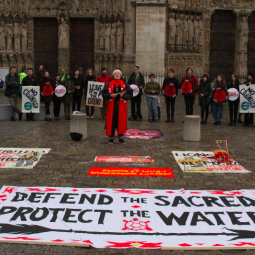
When I arrived in Paris at the very start of the process, it was clear that this time would be different. The whole mood was more positive. Of course there was a degree of solemnity following the terrorist attacks the week before but even so there was a very different feel to the gathering.
My previous experience had been in Rio in 2012 at the UN Sustainable Development Conference. This was a heart-breaking process for me. It showed a world deeply divided and therefore unable to reach any kind of meaningful agreement.
The corporate sector hung out in the top hotels by the best beaches and was arrogant in its insistence that it could solve the problems of the world – provided government got out of the way.
For its part the government delegations were aloof, serious and bogged down in bureaucracy and word-smithing. Meanwhile, civil society, banished to a park miles away in the city centre was neglected, disconnected from the process and though vibrant felt very much a side show. It was all too depressingly symbolic.
Paris was different. After twenty years of negotiations you knew that no-one could afford the embarrassment of failing again. Plus the word on the street was that the French had done a great job of diplomacy even before the conference began.
Then there was the process itself. Again, such a difference. Young people were everywhere – 5,000 of them started the ball rolling with a manifesto created in a flurry of creativity, storytelling and direct action. Indigenous Peoples too had made sure they were present and visible. Though they were expunged from the text of the agreement, they occupied the squares, welcomed the dawn, canoed the rivers and became the voice of nature in the heart of the Paris streets.
The poor countries and Low-Lying States too were better organized and more determined. Their very lives were at stake after all.
So it was no surprise that an agreement was reached and that it was seen as a step forward. But is it enough? Is it an agreement that’s good for the Planet or not?
Well of course this depends on your perspective. In many ways, the final text was the result of sustained pressure from those on the front-line of climate change. It is a victory for people power and certainly a fabulous achievement for over 190 countries to eventually put vested interests to one side and reach a truly global agreement. That in itself is unprecedented and should be celebrated. It points to a future where global action and unity are both possible and essential.
On the other hand, the agreement itself has weaknesses. New Internationalist magazine has produced an excellent analysis based on criteria set in advance and deemed The People’s Test. This notes that very little will change until at least 2020 and that even then, current pledges would result in a disastrous 3.5 degree temperature increase rather than the 1.5 degrees aspired to in the text. Others have also noted that there is nothing binding about the agreement (despite reports to the contrary in the press).
But for me, the danger of the Paris deal lies elsewhere. It lies in our response to it. If we (governments, businesses, people) believe that Paris solves the environmental issue, then we are sunk (literally, if we live on certain Pacific Islands).
The danger lies in thinking that fossil fuels are the problem and that switching to renewables will solve the issue. Fossil fuels are the symptom rather than the disease. Replace fossil fuels with zero carbon energy sources and we just allow the economic machine that is devouring the planet to go on eating its way through forests and mountains, lakes and seas – with just a little less air pollution.
At one level then, until we decouple ourselves from an economic system that is addicted to economic growth and to material possessions we are at risk of driving our own extinction.
At another level, the issue is deeper still. At this level, the level of metaphor, the turbulence of climate change is simply a reflection of the chaos in the human spirit. This drive for more and better, newer, more comfortable causes chaos in our lives, in our hearts, in the planet and yes, in the weather.
For me, finding a place of stillness, of calm, of love and appreciation and living from that place is ultimately what will bring change – and that goes for our activism and our response to Paris too. But this is not news.
It is just another way of saying that we must BE the change we wish to see in the world.










